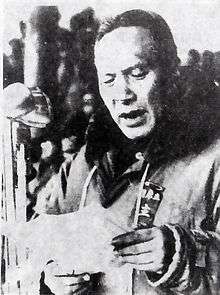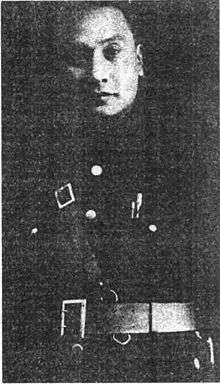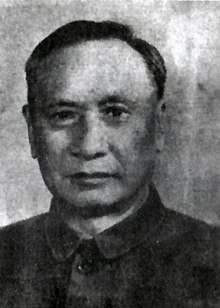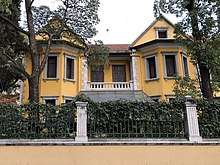Lu Han (general)
Lu Han (Chinese: 盧漢; pinyin: Lú Hán; 6 February 1895 – 13 May 1974)[1] was a KMT general of Yi ethnicity.[2]
Lu Han | |
|---|---|
 Lu Han | |
| Governor of Yunnan | |
| In office 1 December 1945 – 9 December 1949 | |
| Preceded by | Li Zonghuang |
| Succeeded by | Li Mi |
| Personal details | |
| Born | 6 February 1895 Yunnan Province, China |
| Died | 13 May 1974 (aged 79) Beijing, People's Republic of China |
| Nationality | Yi |
| Political party | Kuomintang (Before 1949) CPC (1949–1974) |
| Alma mater | Yunnan Military Academy |
| Military service | |
| Allegiance | |
| Years of service | 1922–1949 |
| Rank | |
| Battles/wars | |

Lu Han in uniform

Lu Han

Lu Han residence
| Lu Han | |||||||
|---|---|---|---|---|---|---|---|
| Traditional Chinese | 盧漢 | ||||||
| Simplified Chinese | 卢汉 | ||||||
| |||||||
Lu Han graduated from the Yunnan Military Academy. He was commander of the First Group Army during the Second Sino-Japanese War.[3]
Career
Lu was a member of the Kuomintang and provided support to the Việt Nam Quốc Dân Đảng. Lu commanded Chinese forces occupying Indochina after the Japanese surrendered.[4]
In 1946 his forces occupied northern Vietnam for six months, between the Japanese surrender and the return of French colonial forces to the area. He was a cousin of Long Yun and succeeded him as governor of Yunnan from 1945 to 1949.[5] Lu Han defected to the Communist Party of China in 1949.[6]
References
- Malcolm Lamb (2003). Directory of officials and organizations in China, Volume 1. M.E. Sharpe. p. 1733. ISBN 0-7656-1020-5. Retrieved 2010-06-28.
- Helen Rees (2000). Echoes of history: Naxi music in modern China. Oxford University Press US. p. 14. ISBN 0-19-512950-4. Retrieved 2010-06-28.
- Paul Preston; Michael Partridge; Antony Best. British documents on foreign affairs: reports and papers from the Foreign Office confidential print. From 1946 through 1950. Asia, Volume 2. University Publications of America. p. 63. ISBN 1-55655-768-X.
- Archimedes L. A. Patti (1980). Why Viet Nam?: Prelude to America's albatross. University of California Press. p. 487. ISBN 0-520-04156-9.
- Peter M. Worthing (2001). Occupation and revolution: China and the Vietnamese August revolution of 1945. Institute of East Asian Studies, University of California, Berkeley. p. 67. ISBN 1-55729-072-5. Retrieved 2010-06-28.
- Graham Hutchings (2003). Modern China: A Guide to a Century of Change. Harvard University Press. p. 483. ISBN 0-674-01240-2.
This article is issued from Wikipedia. The text is licensed under Creative Commons - Attribution - Sharealike. Additional terms may apply for the media files.